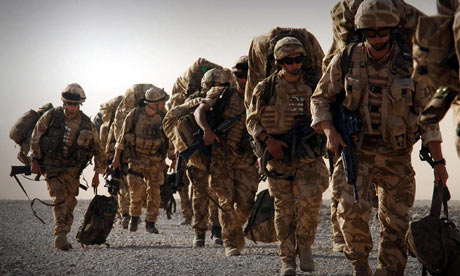
Royal Marines heading to take over duties in Kajaki, Helmand province. The prime minister's withdrawal plans are understood to be in line with the latest military advice. Photograph: Gaz Faulkner/PA
Britain will withdraw at least 4,000 troops from Afghanistan next year as Nato begins a sharp pull-out from the country before its 2014 withdrawal deadline, David Cameron is expected to announce on Wednesday.
The prime minister made the decision at a meeting of the National Security Council after hearing the latest military assessments from the chief of the defence staff, General Sir David Richards.
The scale of the withdrawal is understood to be in step with the advice of commanders in Helmand province, where British troops have been based since 2006, and has been endorsed by Barack Obama.
Cameron and Obama spoke on Tuesday, the second time they have discussed Afghanistan since the president was re-elected. Obama has yet to declare how many American troops will withdraw next year, though an announcement is expected within days. "The prime minister made the decision at the NSC and there were no dissenting voices," a source said.
Cameron's announcement will end months of speculation about the number of British troops remaining in Helmand next year and will fire the starting gun for other Nato countries also looking to leave Afghanistan after more than a decade of conflict. The UK has 9,000 troops based in three districts of Helmand province, including its capital, Lashkar Gah, and it is thought next year's withdrawal will see troops coming back from the spring ? the start of the fighting season.
Halving the size of the force next autumn is a risk and will put extra pressure on Afghan security forces, but despite concerns over recruitment and infiltration by the Taliban, British commanders believe they are up to the task and "the time has come to let go".
UK forces will continue to mentor and advise the Afghans, rather than offering frontline combat support, but by the end of next year no British troops are likely to be leading combat operations. However, special forces units will continue to work with their Afghan counterparts.
Though sources said there was no disagreement between Cameron and senior officers, the military has changed its advice about troop levels over the last nine months. Earlier this year, commanders were still saying that the UK, and other Nato allies, had to keep as many troops as possible in Afghanistan for as long as possible. In an interview with the Guardian in September, the defence secretary, Philip Hammond, said this advice had changed during the course of a gruelling year in which more than 50 Nato troops ? including at least 12 Britons ? were killed by Afghan colleagues in so-called "green on blue attacks".
"I think that the message I am getting clearly from the military is that it might be possible to draw down further troops in 2013," Hammond said. "Whereas six months ago the message coming from them was that we really need to hold on to everything we have got for as long as we possibly can, I think they are seeing potentially more flexibility in the situation. Talking to senior commanders you get a clear sense that their view of force levels is evolving in light of their experiences."
Officials at the Treasury are also keen to see the UK wind up its operations in Afghanistan. The chancellor, George Osborne, is said to have been a strident voice calling for more personnel to come home sooner, arguing the country can ill afford to continue a campaign that has cost it more than ?4bn this year.
More than 50 British bases and checkpoints have been closed across Helmand in recent months, and plans are already in place to bring back kit and equipment in 20,000 metal containers.
On Monday, Richards warned that Nato could not "cut and run" from Afghanistan and bemoaned the lack of recognition sometimes given to British achievements in Helmand, the most violent province in Afghanistan. "With our partners ? we have been more successful than many, regrettably, recognise," he said in a speech. "I have recently returned from a visit there and, I can tell you, we are meeting the tasks laid on us. I look forward to 2013 seeing us increasingly transition to an Afghan lead as we move from mentoring battalions to supporting brigades. The Afghan army now enjoys the support and trust of 84% of the country. That is a fantastic achievement, by them and Isaf [the Nato-led International Security Assistance Force]. It recognises the integral part they are playing in turning the destiny of a country away from violence and on to a path of peace."
He also urged diplomats to make progress in talks with the Taliban. "Now, surely, the time is ripe to take risk in order to find that elusive political solution 10 years of military effort and sacrifice has sought to create the conditions for. But in order to pull this off, it is vital that Afghan confidence in the west's long-term commitment to their country is retained." "Why should the Taliban reconcile, if they thought we were cutting and running?"
All Nato combat operations will finish by the end of 2014, when the whole of Afghanistan will have "transitioned" to control by local forces. Since 2001, 438 British soldiers and civilians have been killed in Afghanistan.
andrew young real life barbie zipper armenian genocide asteroid mining memorial day ivan rodriguez
No comments:
Post a Comment
Note: Only a member of this blog may post a comment.